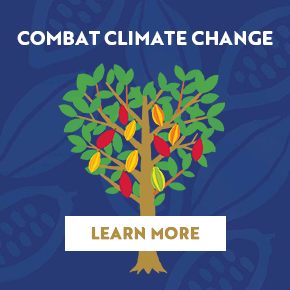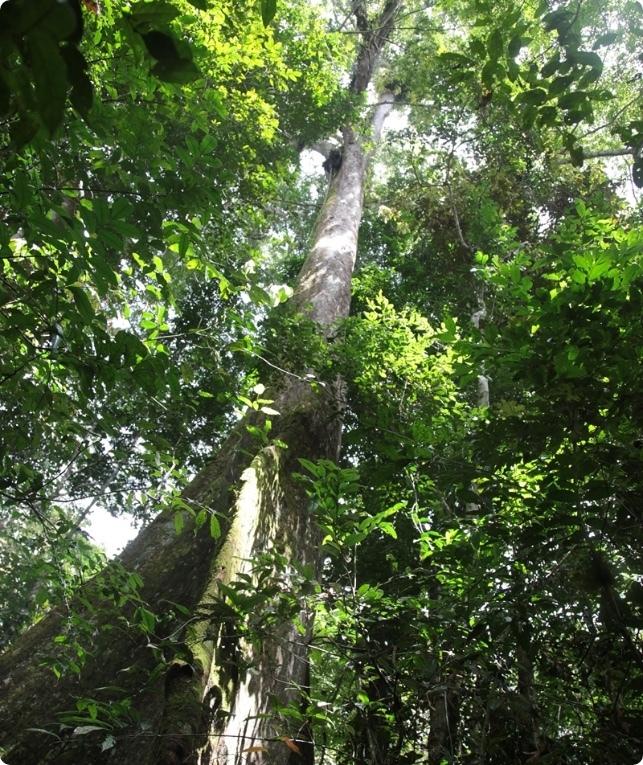Ghana and the Ivory Coast together cultivate more than half of the world’s cocoa. There are approximately 800,000 cocoa farms in Ghana, and 60% of farmers in Ghana rely on cocoa for their main income. Still for all, cocoa farmers typically earn only as little as $1 per day (about 72p), and this poverty has driven cocoa farmers to expand farms into forest areas, contributing to deforestation and climate change. Cocoa itself is an extremely sensitive crop and is susceptible to changing weather conditions such as flooding and drought which is already impacting harvest and yields.
Divine Chocolate directly invests in producer support and development programmes that includes initiatives to help reduce the environmental footprint within the farmer cooperatives from which cocoa and sugar is sourced.
Cooperativa de Exportação de Cacao de Qualidade (CECAQ-11) is a Fairtrade and Organic certified cocoa cooperative based in the southern part of the African island nation of São Tomé and Príncipe. Due to its rich volcanic soil and location, the island is well suited for the cultivation of premium cocoa. With a population of around 215,000, cocoa is its most important export product. Since 2018, we have worked with CECAQ-11 to source the cocoa for Divine’s Organic range. Our work togetherhas focused on sustainable agriculture as a means to promote good agricultural methods, which are organic, regenerative, adaptive to climate change, and increase the productivity of existing land.
Ngoleagorbu Cocoa Farmers’ Union (NGOCFU) is a cooperative of cocoa farmers living on the edge of the Gola Rainforest in Sierra Leone, one of the last remaining fragments of West Africa’s ancient rainforest. ‘Ngoleagorbu’ means ‘We who live at the edge of the forest’. Divine has been working with NGOCFU since 2018, and is leading an innovative pilot project with the Cocoa Origins programme to develop the first Forest-Friendly Cocoa Vision, criteria and practices which can be replicated in other cocoa supply chains and origins.
The Forest Friendly Cocoa Vision is about working together to farm sustainably, protect the rainforest, and support the sustainable livelihoods of forest-frontier farmers and their organisations. Funded by IDH (Sustainable Trade Initiative), the project will build knowledge in the cocoa sector and improve the livelihoods of farmers living on the edge of the Gola Rainforest. As part of our learnings from this project, we are proud to have developed the world’s first ever Forest-Friendly criteria, which has generated significant interest from the cocoa sector and is something we hope can be replicated by more producer organisations. We have also built upon and reinforced our learnings about the importance of the connection between Fairtrade and environmental justice.
“The rainforest protects us by cleaning the air we breathe and providing fresh water for our farms and communities. So we protect the forest. We don't farm there, we don't log the trees, and we do not go there to fish or hunt”.
Sidie Sesay, member of NGOLEAGORBU.
Kasinthula Cane Growers’ Association (or KCGA) is a Fairtrade certified sugar cane farmer association based in southern Malawi. KCGA has supplied Fairtrade sugar for Divine’s chocolate for over a decade. Divine is proud of its relationship with Kasinthula since sourcing Fairtrade sugar is quite unusual for chocolate companies. In recent years, land and crops in Malawi have suffered from a devastating cycle of flooding, drought and crippling debt, so we have shifted our focus from sustainable agriculture and gender justice to supporting Kasinthula to navigate internal and external shocks such as climate change. A tree nursery has been established and a woodlot has been planted to minimise deforestation, as well as to make use of ground that is not currently used for food crop or sugar production.
Product and Packaging
All our chocolate products are palm oil free, soy free, and GMO free. All our chocolate bars are produced by our parent company Ludwig Weinrich GmbH & Co in Germany, whose factory has been ‘climate-neutral’ since 2016. This means that Weinrich not only works to reduce CO2 emissions, but also offsets unavoidable emissions from chocolate manufacturing through certified climate protection projects in the Global South.
We take pride in making sure our packaging is as environmentally friendly as possible, and our Easter range is an example of this. Our Easter Egg boxes are now 100% plastic free, and made from cardboard and foil that can be fully recycled! We’ve also put a lot of effort into cleverly engineering the boxes into a snug triangular shape reducing the amount of cardboard, removing the plastic tamper seal and plastic inner that held the egg in place using a cardboard structure instead. The box is now an FSC certified cardboard structure which means it is made with material from well managed forests and or recycled sources.
Across our value chain
Divine Chocolate is committed to doing all we can to make improvements to reduce our impact on the planet.
We also work with our supply chain to reduce road and sea miles and we never use air freight or take internal flights. In the UK, we moved our offices to Sustainable Workspace in 2020, a co-working office for purpose-led organisations in South London. The building is made from as much reclaimed and environmentally friendly materials as possible, the majority of furniture is second hand and the building uses 100% renewable energy.






